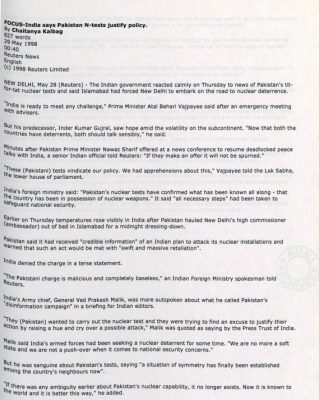Focus- India says Pakistan N-tests justify policy
[Reuters]
Published date: 29th May 1998
29 May 1998
Reuters News
English
(c) 1998 Reuters Limited
NEW DELHI, May 28 (Reuters) – The Indian government reacted calmly on Thursday to news of Pakistan’s tit-for-tat nuclear tests and said Islamabad had forced New Delhi to embark on the road to nuclear deterrence.
“India is ready to meet any challenge,” Prime Minister Atal Behari Vajpayee said after an emergency meeting with advisers.
But his predecessor, Inder Kumar Gujral, saw hope amid the volatility on the subcontinent. “Now that both the countries have deterrents, both should talk sensibly,” he said.
Minutes after Pakistan Prime Minister Nawaz Sharif offered at a news conference to resume deadlocked peace talks with India, a senior Indian official told Reuters: “If they make an offer it will not be spurned.”
“These (Pakistani) tests vindicate our policy. We had apprehensions about this,” Vajpayee told the Lok Sabha, the lower house of parliament.
India’s foreign ministry said: “Pakistan’s nuclear tests have confirmed what has been known all along – that the country has been in possession of nuclear weapons.” It said “all necessary steps” had been taken to safeguard national security.
Earlier on Thursday temperatures rose visibly in India after Pakistan hauled New Delhi’s high commissioner (ambassador) out of bed in Islamabad for a midnight dressing-down.
Pakistan said it had received “credible Information” of an Indian plan to attack its nuclear installations and warned that such an act would be met with “swift and massive retaliation”.
India denied the charge in a terse statement.
“The Pakistani charge is malicious and completely baseless,” an Indian Foreign Ministry spokesman told
Reuters.
India’s Army chief, General Ved Prakash Malik, was more outspoken about what he called Pakistan’s
“disinformation campaign” in a briefing for Indian editors.
“They (Pakistan) wanted to carry out the nuclear test and they were trying to find an excuse to justify their
action by raising a hue and cry over a possible attack,” Malik was quoted as saying by the Press Trust of India. Malik said India’s armed forces had been seeking a nuclear deterrent for some time. “We are no more a soft state and we are not a push-over when it comes to national security concerns.”
But he was sanguine about Pakistan’s tests, saying “a situation of symmetry has finally been established
among the country’s neighbours now”.
“If there was any ambiguity earlier about Pakistan’s nuclear capability, it no longer exists. Now it is known to the world and it is better this way,” he added.
But Vajpayee’s Hindu nationalist Bharatiya Janata Party (BJP) did not mince words, charging that Pakistan had been gathering the wherewithal for a nuclear weapons programme while “the so-called “anti-nuclear’ lobby was shedding crocodile tears of concern about nuclear proliferation”.
Pakistan’s nuclear tests on Thursday confirm that it has been clandestinely building up its nuclear weapons potential with covert help from certain countries,” BJP president Kushabhau Thakre said in a statement.
News of Pakistan’s five nuclear test blasts broke in the midst of a heated debate in India’s parliament on New Delhi’s own five tests on May 11 and 13.
Angry opposition lawmakers attacked the BJP for taking India down the dangerous path to an arms race on the subcontinent, demanding to be told why New Delhi had broken a 24-year freeze on testing.
Asked if India’s tests two weeks ago may have spurred Pakistan to conduct its own series of tests earlier on Thursday, Vajpayee told reporters: “No, we did not. In fact Pakistan … forced us to take the path of nuclear deterrence.”
Asked if India would review its moratorium on further tests after Thursday’s Pakistani tests, Vajpayee said: “A new situation has been created and it will be taken into account in formulating our policy.”
Pandemonium broke out in India’s parliament when news of the Pakistani nuclear tests was shouted out by an opposition deputy.
Communist Party of India-Marxist leader Somnath Chatterjee said: “It is a nuclear arms race which you have started in this region.” He demanded to know why Indian Intelligence had not had any clue of the Pakistani blasts for two hours.
Vajpayee told the furious lawmakers there would need to be a “grave, calm and determined” debate.
These (Pakistani) tests have created a new situation … We may have our differences but if the challenge Is from abroad, then that challenge must be met with a united House and a united nation,” he said.
Pakistan’s nuclear policy has been India-specific, and Kashmir-specific,” Home (Interior) Minister Lal Krishna Advani said in a strongly-worded speech, referring to the Himalayan region over which the neighbours have fought two wars.
India, which controls two thirds of Kashmir, accuses Pakistan of stoking the eight-year-old insurgency there. Islamabad says it only offers moral and diplomatic support to the territory’s Moslem rebels.






